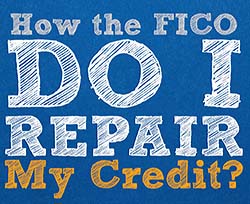Improving your FICO® credit score is a gradual process that demands patience and diligent financial management. These scores are a crucial measure of your creditworthiness, playing a significant role in determining the terms of loans, mortgages, and credit cards you can secure. They are based on an analysis of your credit payment patterns over a period, giving more weight to recent financial behaviors compared to older ones.
FICO scores provide lenders with insights into your financial responsibility and reliability. Higher scores signify a lower credit risk and can result in favorable interest rates and better loan terms. However, achieving a desirable FICO score requires a consistent history of responsible borrowing and payments.
Tips to Improve Your FICO Credit Score:
Below are some general tips to follow that may increase your FICO credit score:
1. Monitor and Address Negative Factors:
- Regularly check the negative factors listed with your FICO score to understand key areas for improvement.
- Address these areas diligently to enhance your credit standing.
2. Smart Management of New Accounts:
- Avoid opening unnecessary accounts: Opening new accounts for the sole purpose of improving your credit profile is not advisable.
- Open new credit accounts responsibly when needed and maintain a positive payment history.
3. Maintain Low Balances on Revolving Credit:
- Strive to keep balances low: High outstanding credit card debt can negatively impact your FICO score.
- Manage revolving credit responsibly to maintain a favorable credit utilization ratio.
4. Prioritize Debt Repayment:
- Focus on debt payoff: Instead of shifting debt between credit cards, work on paying down your total revolving debt.
- Prioritize paying off debt to see a positive impact on your FICO score.
5. Timely Bill Payments:
- Prompt bill payments: Make sure to pay all your bills on time to maintain a good credit record.
- Avoid delinquencies and collections to prevent a major negative impact on your FICO score.
6. Optimize Credit Card Usage:
- Responsible credit card management: Utilize your credit cards within the recommended credit limit to showcase responsible financial behavior.
- Regular, timely payments on credit cards contribute positively to your FICO score.
7. Strategic Loan Rate Shopping:
- Plan your loan rate shopping: If you're looking for a loan, do your rate comparisons within a focused timeframe to minimize negative impacts on your FICO score.
8. Strategic Account Management:
- Avoid unnecessary account closures: Closing unused credit cards without a clear reason can potentially harm your FICO score.
- Maintain a healthy credit mix and usage to demonstrate responsible financial behavior.
9. Seek Professional Guidance if Needed:
- Consult a credit counselor: If you're facing financial difficulties, consider seeking assistance from a legitimate credit counseling service to improve your financial management.
- Focus on managing your credit responsibly to enhance your FICO score over time.
10. Rebuild Credit History:
- Establish new credit accounts: Responsibly open new accounts to rebuild your credit history and showcase positive financial behavior.
- Ensure timely payments on these new accounts to demonstrate creditworthiness.
11. Maintain a Long-Term Focus:
- Understand the impact of time: Past credit issues have less influence on your FICO score as they age, and recent good payment history matters more.
- Consistent, on-time payments over an extended period will gradually improve your credit profile.
12. Practice Informed Loan Shopping:
- Consolidate loan inquiries: When shopping for loans, do so within a concentrated period to minimize the impact on your FICO score.
- Be aware of the purpose: Understand how FICO scores differentiate between loan searches to manage your applications wisely.
13. Maintain a Balanced Credit Mix:
- Diversify your credit portfolio: Having a mix of credit types, including credit cards and installment loans, can positively influence your FICO score.
- Showcase responsible credit management across various credit accounts.
14. Regular Credit Monitoring:
- Monitor your credit report: Regularly check your credit report for any inaccuracies or discrepancies that may be affecting your FICO score.
- Address errors promptly to ensure an accurate representation of your credit history.
Reasons to Improve Your FICO Credit Score:
Improving your FICO credit score is essential for several compelling reasons:
1. Better Interest Rates:
Having a higher FICO score allows you to qualify for lower interest rates on loans and credit cards. This results in substantial savings over the life of the loan or when carrying a credit card balance.
2. Easier Loan Approval:
A high FICO score increases your chances of getting approved for loans, including mortgages, auto loans, and personal loans. Lenders view a higher score as an indicator of lower risk.
3. Access to More Credit Options:
A good credit score broadens your access to a variety of credit products, providing more options to manage your finances effectively and choose credit that suits your needs.
4. Lower Insurance Premiums:
Insurance companies often use your FICO score to determine your insurance premiums. A higher score can lead to lower premiums, saving you money on insurance policies.
5. Enhanced Rental Opportunities:
Landlords may check your credit score when considering rental applications. A good FICO score improves your chances of securing a rental property and may even lead to better rental terms.
6. Employment Opportunities:
Some employers review credit scores as part of their hiring process, especially for roles involving financial responsibilities. A higher FICO score can positively impact job prospects.
7. Financial Security and Peace of Mind:
Maintaining a good credit score provides a sense of financial security and peace of mind, knowing that you have a strong credit foundation to support your future financial goals and endeavors.
Improving your FICO credit score is a proactive step toward financial well-being and stability, offering a wide array of benefits that can positively impact your financial life.
- What Credit Score Do You Need to Buy House With No Money Down?
- Does Wells Fargo Offer Home Loans with a 500 Credit Score?
- First Time Home Buyer Loans with Bad Credit and Zero Down
- Who Qualifies for Kamala Harris' $25,000 Homebuyer Program?
- Biden Administration's Bold Move for Affordable Housing Plan
- Biden's Student Debt Relief Plan: A Beacon of Hope for Borrowers
- FHA Mortgage Rates by Credit Score: 620, 700, 580, 640
- How Long Does It Take to Get a 700-800 Credit Score?
- How To Improve Your FICO Credit Score: A Guide
- FHA Credit Score Requirements for Homeownership
- 10 Proven Methods to Elevate Your FICO Credit Score
- Mortgages for Low Credit Scores: Your Complete Guide


 What is a FICO Score? Most credit bureau scores in the U.S. are calculated from software developed by Fair Isaac and Company. They are commonly referred to as FICO scores and include a rating based on information found in credit reports.
What is a FICO Score? Most credit bureau scores in the U.S. are calculated from software developed by Fair Isaac and Company. They are commonly referred to as FICO scores and include a rating based on information found in credit reports. The housing market may be coming back, but a growing number of policy makers have expressed concerns recently that it’s still too hard to get a mortgage.
The housing market may be coming back, but a growing number of policy makers have expressed concerns recently that it’s still too hard to get a mortgage. If you're self-employed or have a small business, the idea of a 401(k) may make you jump to two conclusions: “My company is too small” or “I can’t afford it.” Well, you’re not too small and you can afford it!
If you're self-employed or have a small business, the idea of a 401(k) may make you jump to two conclusions: “My company is too small” or “I can’t afford it.” Well, you’re not too small and you can afford it!




